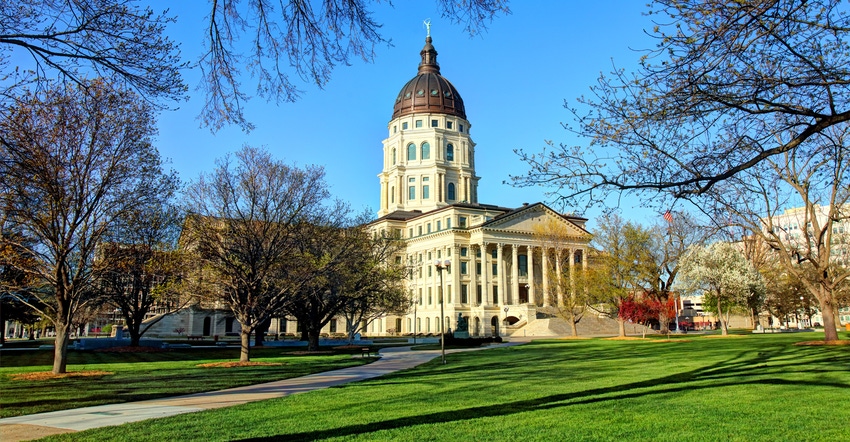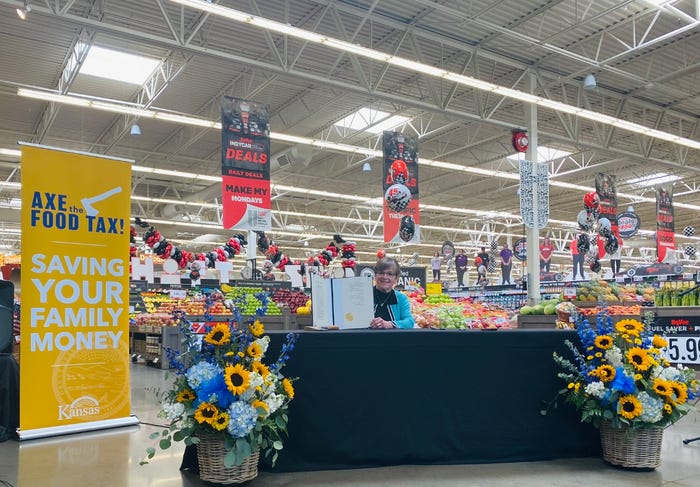
The 2022 Kansas legislative session adjourned Monday. State senators and representatives have been busy passing bills that will affect the lives of rural residents and Kansas farmers. Kansas Gov. Laura Kelly has signed some into law and vetoed others.
Axe the tax
May 11, Kelly signed the bipartisan House Bill 2106, thus “axing the tax” and eliminating the state sales tax on groceries. The session saw a lot of back-and-forth on the topic, but the version that passed and was signed will phase out the state’s food sales tax by 2025. Kelly has called on the Kansas Legislature to fully implement the elimination of the state food sales tax on July 1, so Kansans can have immediate relief from the current 6.5% tax.
State agency budget
Kansas Sorghum reported at the end of April, Kelly signed House Sub for Senate Bill 267, the budget for state agencies for fiscal years 2022, 2023 and 2024. SB 267 leaves an ending balance projection of $1.4 billion in fiscal year 2022, and $895 million in fiscal year 2023.
On-farm milk sales
Kelly signed SB 345, which allows for the on-farm retail sale of milk or milk products, and regulates the labeling and advertising of those products. The bill also allows the Kansas Secretary of Agriculture to declare an imminent health hazard when necessary to protect public health, and allows Kansas Department of Agriculture KDA to assess civil penalties for certain violations.
Housing development
Kelly signed two bipartisan house bills into law that will provide a combined $62 million for affordable housing development. The 2021 statewide housing needs assessment, the first undertaken in nearly 30 years, showed the need for more high-quality, affordable housing in all regions of the state, including rural areas.

The first measure designates an additional $20 million for the 2022 fiscal year from the state General Fund, and $20 million in American Rescue Plan Act (ARPA) funds for the Kansas Housing Resources Corp.’s Moderate Income Housing program. These funds will be awarded to communities with populations less than 60,000 to develop multifamily rental units and single-family, for-purchase homes. The same bill sets aside $20 million from the State General Fund for fiscal year 2023 to establish the Rural Housing Revolving Loan Program. This program will provide loans or grants to rural communities for moderate- and low-income housing development or related infrastructure.
HB2237 will establish the Kansas Rural Home Loan Guarantee Act, which will allow KHRC to guarantee loans for the difference between the cost of construction and the appraised value of single-family homes in counties with populations of less than 10,000.
Child care
Beyond that, HB2237 also expands eligibility for the Child Day Care Services Assistance Tax Credit, so even more Kansas businesses can assist employees with child care services. Across the state, legislators heard from families and businesses about the need for expanded child care with expanded business development. Studies show that for every $1 spent on expanding child care, there is a return on investment of $13.
“One of the major barriers to entry in the workforce is the incredibly high cost of child care,” Senate Democratic Leader Dinah Sykes says. “The expanded child care tax credit provides incentives for employers from C corp[oration]s to mom-and-pop operations to ensure employees don’t have to choose between having a career and having a family. Policies like these are crucial to ensuring that all Kansans — and particularly, Kansas women — have the opportunity to participate fully in our society and economy.”
Technical education
Kelly signed the bipartisan House Bill 2466, which will promote computer science education in Kansas schools and provide more funding for current and future teachers to receive training in computer science programs. It also establishes a pilot program that covers credential exam costs, and assists career and technical education students in their transition to the workforce.
HB 2466 provides scholarships for educators in rural areas and underrepresented socioeconomic groups to get computer science education training.
Vetoes
Kelly also vetoed several bills, including:
Substitute for Senate Bill 34. Kelly says that this bill goes beyond COVID-19 vaccine passports and mandates and “implements a one-size-fits-all approach for all infectious diseases. It significantly limits any government entity’s response to any infectious disease outbreak.” She says the bill would limit response to measles outbreaks in classrooms, and KDA could not fight zoonotic diseases that could harm our state’s agricultural industry, like avian influenza.
HB 2387. Kelly says the language in the bill jeopardizes the state’s Medicaid program and prohibits the state Medicaid agency from pursuing Kansas’ independent procurement process. It would “functionally provide the current managed care organizations with a no-bid, multi-billion-dollar contract.”
The Kansas Office of the Governor and Kansas Sorghum contributed to this article.
About the Author(s)
You May Also Like






